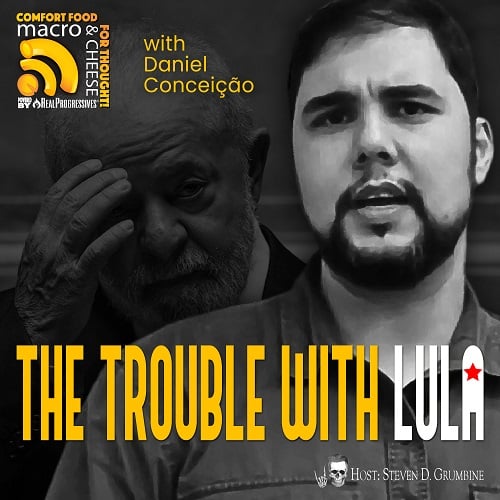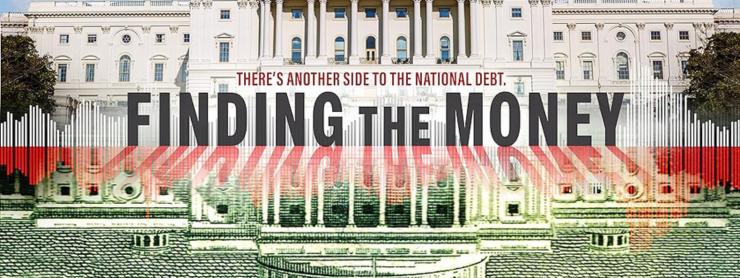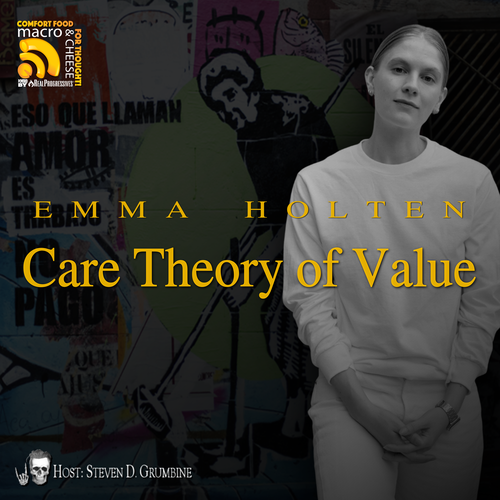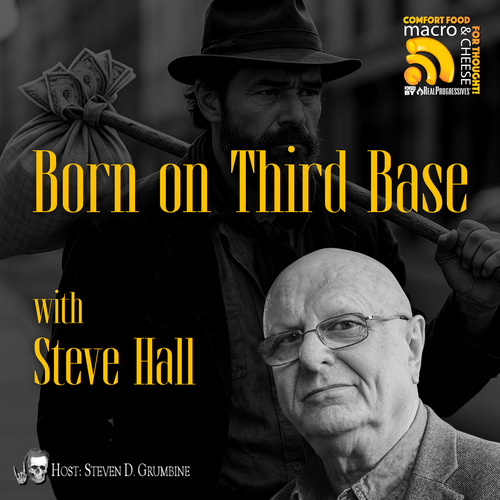Episode 244 – The Trouble With Lula with Daniel Conceição

FOLLOW THE SHOW
Daniel Conceição talks about the current situation in Brazil. They can change presidents, but austerity and fiscal conservatism remain constant.
A head of state whose economic policies promote austerity and fiscal responsibility is:
- Conservative
- Progressive
- N/A (not applicable)
Daniel Conceição is with us for his third visit to Macro N Cheese. He and Steve discuss the failures of both right and left governments. Some broad strokes of Brazil’s historical patterns are not so different from those in the US. The last left(ish) president, Dilma Rousseff, abandoned her Leninist roots and hopped aboard the privatization train. It wasn’t enough to protect her from impeachment, however.
It’s easy to see parallels between Bolsonaro and Trump as well as the lesser evilism we’re facing in both our countries today. Despite President Lula’s progressive rhetoric, his economic policies prioritize deficit reduction. His administration is committed to delivering fiscal results to financial markets over public investment in education, healthcare, and other social services.
Daniel touches on the “dollarizing” of Argentina’s economy and explains that it can only exacerbate instability and conditions of scarcity.
Daniel and Steve talk about the insights gained from Modern Monetary Theory and agree that building power beyond elections requires a paradigm shift in our thinking.
Daniel Negreiros Conceição did his undergraduate studies in Economics at the Federal University of Rio de Janeiro in Brazil and his postgraduate studies at UMKC (under Professors Wray, Kelton, et al). He is a professor of macroeconomics and public finance at the Federal University of Rio de Janeiro. He helped create the Institute for Functional Finance and Development (iffdbrasil.org), where he currently serves as president, and he helps run the Brazilian Modern Money Network (https://mmtbrasil.com/) aimed at producing more easily accessible material for teaching MMT to the wider public.
@stopthelunacy on Twitter
Macro N Cheese – Episode 244
The Trouble With Lula with Daniel Conceição
September 30, 2023
[00:00:00] Daniel Conceição [Intro/Music]: If the government has enough money to build a whole bunch of stadiums, to build up infrastructure, to get us ready for the World Cup and then the Olympics, why can’t they do the same for education, healthcare, public safety, and all of that? So, people got to the streets and they started calling for more public investment.
I’d rather that the rich paid no taxes than to pretend that taxes are a prerequisite for public spending, because I’m not going to lie anymore. And I’m not going to pretend that you’re not lying.
[00:01:35] Geoff Ginter [Intro/Music]: Now, let’s see if we can avoid the apocalypse altogether. Here’s another episode of Macro N Cheese with your host, Steve Grumbine.
[00:01:43] Steven Grumbine: Alright. This is Steve with Macro N Cheese. It’s going to be another great episode with my buddy, Daniel Conceição. Daniel is a Professor of Public Administration and Macroeconomics at the Federal University of Rio [de Janeiro] and a president of the Institute for Functional Finance and Development in Brazil.
The reason why I brought Daniel on, aside from the fact that the guy is just a genius, is that he also has the passion and the understanding of a revolutionary spirit. A mind that is not afraid to say the things that need to be said, with the pointedness and energy it needs to be said with. And let me further elaborate on that.
In my other show, the Rogue Scholar, I spoke at some length about [how] it doesn’t matter what political party you’re in. If you run for office and you don’t understand macroeconomics, you are going to screw your constituents and you are going to make really bad things happen, as have been continuously happening throughout the course of history.
In particular, as we watch catastrophic climate crisis hitting us and people suffering around the globe, we’re going to look on one of the left wing stories in Lula in Brazil. Lula said all the right things. He’s got all the right credentials. But when you hear what his economic policies are, I think you’re going to find yourself saying, “I thought we elected a lefty.”
Your lefty is living in a neoclassical monetarist world where austerity is king. Without the economic understanding as the foundation from which all values spring forth, you get nothing in life. Let’s bring on Daniel. Daniel Conceição, welcome to the show, sir.
[00:03:39] Daniel Conceição: Well, thank you for having me again. It’s a wonderful introduction there. You said it.
[00:03:47] Grumbine: The planet is on fire and people are struggling. And I know what it looks like in the US. But Brazil! All we heard about was: “we’ve brought Lula back” and the information I’m seeing coming out of Brazil, isn’t so sweet.
[00:04:06] Conceição: It’s not sweet at all. It’s very disappointing. What’s more disappointing even is that Lula still supposedly keeps saying the right things. You still hear him say things that make you believe that he’s embracing progressive policies that are reality informed. Policies that take advantage of what should have been learned with no element of doubt during the pandemic: taxes don’t fund anything. You can’t have a government that relies on taxes to pay for the stuff that the public needs, because the state is the only creature that can create money. That’s the basic truth that we learned during the pandemic. We’ve saved ourselves during the pandemic doing it. Realizing that there were no financial constraints on government spending.
And now we’re back to pretending that we should try to balance budgets and we should deliver pretty fiscal results to financial markets, as if those financial markets haven’t been openly sabotaging our state in Brazil. It’s crazy. It’s revolting. That’s what it is.
[00:05:19] Grumbine: We’ve talked at length throughout the almost 250 episodes we’ve done at Macro N Cheese, plus all the work that every other MMTer has ever laid out in front of the world, trying to get people to understand and move forward with the way fiat currencies work. And fiat currencies rule the world: China, Russia, Australia, Canada, the EU, the UK, Africa, everywhere.
[00:05:47] Conceição: Exactly.
[00:05:48] Grumbine: There is fiat, and everywhere the rules, minus whatever local political games they play, the structure is the same. The way it works is the same. And you’ve got Lula. It’s not really him, it’s Haddad.
[00:06:05] Conceição: Yeah. Let’s point the finger. That’s the main infiltrated agent within his government, the representative of the financial markets and their spokespeople, that’s Haddad.
[00:06:17] Grumbine: Let’s talk a little bit about him. Let’s bring him into the sunlight for everybody to see. What is it that he is advancing? We saw a zero deficit, balanced budget, no money spent above what is brought in by taxes. Once again, an austerity movement, but break that down for us. Let us know what is really happening there.
[00:06:39] Conceição: So this is something that has been developing for a while. Even prior to Bolsonaro’s rise to power. The workers party had lost its space and really had been the victim of a coup. Dilma Rousseff, who was the president at the time, suffered an impeachment that was based on absolutely bogus accusations, but it had to do with the doctrine of fiscal responsibility.
So basically she was accused of committing some fiscal crimes. And because Congress had always been interested in getting rid of her, because it’s a bunch of sellouts. And if they can have an even more corrupt government in power to service their interests, they’ll do it. So they got rid of Dilma. The reason why she lost so much popular support so quickly is because, I don’t know if you’ve followed, but prior to the world cup here in 2013, we had a whole bunch of uprising in the streets and people were pissed partially because a bunch of students were calling for free transport systems, public transport.
They wanted them to be more affordable, then some of them asked for free transport. And then other people joined in because those kids got beat up by the police, started denouncing police brutality. And then it got mixed with calling for better healthcare, better education, especially because the World Cup was very expensive.
And people notice, that if the government has enough money to build a whole bunch of stadiums, to build up infrastructure, to get us ready for the World Cup and then the Olympics, why can’t they do the same for education, health care, public safety, and all of that? So people got to the streets and they started calling for more public investment.
Now, the problem is a whole bunch of right wing groups got notice and realized that, oh, this is a great opportunity to rile up people against this left leaning government. Especially because this is a government that doesn’t really do all of the things that the public is asking for. And so they started fueling this right-wing anarchistic feeling against all institutions.
Now the problem is political parties. And the problem is these lefties in government. And all of a sudden you have a whole bunch of people really joining forces to get rid of the supposedly corrupt workers party government. And in the middle of this, here’s what’s so crazy, the response by the government, because the mainstream media was accusing Dilma of being fiscally irresponsible. The response was to deliver the most aggressive austerity package that we had ever done in Brazil prior to that point. So there was a huge cut in spending, and that happened at the same time when our exports had taken a huge drop.
So we had both, we had the reduction in public spending and the reduction in exports at the same time. And that obviously, because we know that we live in monetary economies, if you have less demand, you can’t sell as much. And if you can’t sell as much, you’re going to fire a whole bunch of people. So we got sent into a huge nosedive recession. And this was perfect for getting rid of Dilma because the public really upset. And now we have a recession and a lot of people are poor and they can’t afford much and they’re unemployed and they’re asking for more public investment and they’re seeing none of it. They’re actually seeing the opposite.
So it was very easy to justify the impeachment at that point. Now, then we had, firstly, an ultra liberal president in Michel Temer, who was her vice president. And he was actually always looking for a chance to overthrow her. And he finally got the chance and he had been entrusted by our saboteurs, by our financial elites and corrupt capitalists. He had been entrusted by them to come up with a huge privatization plan, and really to destroy the state in as little time as possible. And so he came up with a few reforms.
One was to do away with our pension fund system. Our public pension fund was reformed and became a lot less generous. And the other thing was to impose the spending ceiling, that froze primary public spending in real terms for 20 years. And he was planning to deliver an administrative, really a state reform, to do away with most of the supposedly big structures of the Brazilian government. They always talk about modernizing it, but really it’s to make it easier for public servants to be fired and replaced by private contractors.
That’s what they want. And that’s why a lot of capitalists supported him because they saw an opportunity to take advantage of the reduction of, for instance, public universities. So if you’re the owner of private universities, well, that’s a good chance for me to become richer. And even private prisons now is something that is being proposed during this government, during Lula’s government. That’s something that I’ll tell you about later.
So this was Temer and Temer’s government was so bad that people were ready to embrace a monster, really what it was. So they found their own Trump, their own version of a fascist lunatic that said all the wrong things, that appealed to the worst in people.
And Bolsonaro got elected after Lula got arrested, that’s the other thing. So in order for Bolsonaro to have a chance, Lula had to be taken away from the election. And they did that. Because at that point it was very easy to criminalize everything that anyone associated with the workers party did. So Lula got arrested, Bolsonaro got elected, and we lived our own version of four years in hell in Brazil.
Things got so awful, especially because of the pandemic and how Bolsonaro denied any chance of us dealing with the pandemic in a scientifically informed way. Bolsonaro couldn’t gain his re-election, even after plotting and trying to enact a coup here with the support of the military. But I guess we got saved by Trump losing there, with you guys. Because if Bolsonaro had the support of the US, I’d actually be either in jail or I’d have to leave the country because there was no chance those people would leave us alone.
[00:14:30] Grumbine: So there is a silver lining with Biden after all?
[00:14:34] Conceição: Oh, yeah. Yeah. Actually, we have to learn how to choose between awfuls. Because if we have two terrible options, we have to be able to identify what’s the most terrible within the two. Which is what we’ve been doing for a while. So yeah, Biden is horrible, but Trump was a threat to humanity in a whole other level.
[00:15:02] Grumbine: One of the things that I have noticed, and this is just me trying to survive, is when Trump was in office people on the left, people in the center, united, to fight against the evil. However, the minute that Trump was deposed and Biden took over, three quarters of this country went back to sleep.
We’ve got an existential climate crisis. We’ve got horrible austerity being imposed upon us. And we don’t have nearly a quarter of the army we had willing to fight. In fact, three quarters of that army are now stuck defending Biden’s right wing tendencies. But Biden has already beat Trump, so there’s no need to defend him anymore. Now you can judge him on his own merits and instead he’s given a pass.
This is the danger of lesser-evilism. And I guess my question is when you see the outcomes, you guys were able to get Lula in there and you’re seeing austerity being pushed by a Lula administration. We’re watching austerity being pushed by a Biden administration. He’s celebrating deficit reduction. He had every chance to eliminate student debt, chose not to, chose to negotiate with a terrorist that had no intention of honoring the agreements.
There’s something fundamentally there that both of these organizations support capital, that defend capital. And all their acts are there to prop up capital, not to help people. And so I wonder whether we’re stronger in power, than we are when we collectively prepare to fight back out of power, because I’ve seen very little evidence of the kind of change that you would think such a goodwill of beating Donald Trump would have brought to the US.
Instead of a Green New Deal, we got Build Back Better, that got watered down. So are we better with the evil in the office that we know, or are we better embracing evil that pretends to be our friend, that in the end institutes austerity anyway?
This lesser evilism isn’t winning us anything. I think we need to look for solutions beyond the electoral process.
[00:17:24] Conceição: And I think what we have to do, is exactly what we’re doing now, which is to denounce the undesirable consequences of the actions that the lesser evil takes
[00:17:37] Grumbine: Right. Amen.
[00:17:39] Conceição: Because it’s almost as a, think of a boxing movie, maybe Rocky Balboa. He’s getting beat up until he’s almost dead, and then Mickey goes and yells “Oh Rocky, now you have to do something otherwise you’re gonna lose”, and then he rises up. That moment that allows us to join forces because things are so terrible, is the easiest moment to get everyone to rile up and understand how threatening the evil is.
The problem is that when we were fighting fascism and we were trying to avoid a fascist takeover, either by Trump getting his lunatics to storm the Capitol or our own version here, which was actually closer because Bolsonaro did have a lot of support from the military and from the police forces. But in either case, it’s still better to not be that close to the apocalypse, even though people are more aware of the threats that they face.
And so I think this is the best that we can do is, if we’re faced with two evils, we’re forced to choose the lesser one just as a survival strategy. And then once we are a little bit removed from the apocalypse, we can denounce the other lesser evils, which is what we’re doing right now. And so I think we’re doing what we have to do.
[00:19:09] Grumbine: So, let’s talk about Brazil’s constitution amendment. It sounds like they’re doing everything they can to codify into law an austerity narrative, an austerity doctrine. Talk to me about this amendment.
[00:19:25] Conceição: In this case, the lesser evil may actually be worse because this is what’s happened. Bolsonaro’s spending ceiling, which actually had been enacted by the previous president, the one that took over after Dilma. And so the spending ceiling was so horrible, so impossible to follow, that Bolsonaro started just pretending, that he didn’t have to follow it all the time.
So, he created a whole bunch of opportunities to still spend when it was convenient for him, especially because once he realized that his reelection depended on maintaining support from most people, he realized that he needed to spend more. And so he started finding holes in the ceiling. And those holes actually allowed the government to spend a lot more than it would have under the ceiling.
Obviously during the pandemic, we suspended the ceiling, which has actually proved that there was no lack of money, because government always creates money to spend. But after the pandemic, and after the emergency situation, Bolsonaro still found a whole bunch of holes, opportunities to spend above the ceiling. So, actually the ceiling wasn’t as hard to fight as it is right now.
And so Lula, well, actually Haddad, was supposed to come up with a new fiscal arrangement. And he actually had a whole bunch of Post-Keynesians working with him, or self-proclaimed Post-Keynesians, because I can’t really give them the label of true ‘Post-Keynesian’: if you try to deliver fiscal stability and fiscal responsibility, you can’t claim yourself to be Post-Keynesian. But he had self proclaimed Post-Keynesians working with him and saying that, ‘yes, we must still come up with a credible way of controlling and reducing the deficit and eventually stabilizing the government debt as a share of GDP.’
As if GDP is useful to pay the debt. It’s a whole bunch of messy ideas. They’ve never even tried to justify the austerity in and of itself, theoretically, because they know they can’t. So, what they said is, ‘well, most people call for austerity measures, most people agree that having a stable public debt is a good thing, so we’re going to follow this.’
And again, “most people” should have been better described, because really what they’re saying is, the spokespeople for the financial markets, the spokespeople for banks and the mainstream media, they’re the ones who claim that austerity is good and that controlling the debt is a good thing.
So, they should have come up and said, ‘well, we are going to do what the people who work in finance tell us to do.’ If they said that, at least they would be a little more honest. But their position is, ‘there is no need for us to challenge the idea that fiscal stability is a good thing.’ And so Haddad came up with his new rule, which is basically a new ceiling. But it’s a ceiling that, instead of freezing primary public spending in real terms for 20 years, allows spending to grow by the same amount of 70% of the increase in tax revenues.
So, that’s the first rule. If your taxes increase by 100 Reals, then spending will be allowed to increase by 70 Reals. That’s the first rule. The second rule is, in addition to this, once you’ve discovered what’s your limit to increase spending, it also has to be within an increment of 0.6 percent of GDP and 2.5 percent of GDP. So those are the two rules that limit spending now.
That’s completely out of their butts. There’s no reason to impose such an arbitrary rule that is independent from the economic cycle. You don’t know if this is good or bad. Don’t even know if it’s inflationary. It could be that under some conditions, you would have to spend less.
Usually you shouldn’t because most governments are austerity seeking governments, so usually, spending is way below what it should be. But it’s such an arbitrary rule that even if you were faced with the inflation barrier, it would still be a bad rule. But in any event, it’s a rule that they’ve imposed. And it’s basically intended to bring the path of the public debt into a stable path. Because once you condition spending to increase by only 70 percent of the revenue, you basically are forcing spending to increase by a lower rate than the revenues, year after year.
And so, this is what they’ve done. And this is already a very hard rule to follow, especially for a country that is trying to rebuild itself after the pandemic. To rebuild itself after Bolsonaro all but destroyed our social democracy.
But it’s even worse, because in addition to this, Haddad has committed himself to another goal, to a primary fiscal result target. And we’ve always had primary results targets that were passed as primary surplus targets, even though it never actually required us to deliver a surplus. But because this law was supposed to help the government stabilize its debt as a percentage of GDP, the target was always calculated to be the primary surplus that made interest payments, not increase the debt by more than the rate of GDP growth.
So, this was the supposed usefulness of the law. It’s all stupid, but based on the idea that you need to control your debt because otherwise you go bankrupt and we don’t know what money is, so, we all think that the government can go bankrupt.
And this is actually going back to Dilma’s troubles, because she actually was very committed to never not delivering a primary surplus. So she always attempted to meet a positive result as the required target. But she never actually announced a primary deficit as her target.
And this is actually one of the reasons why some of the actions that she had to undertake, to try to mask the failure of reaching a primary surplus during her time, were actually considered to be crimes. And most of those actions were intended to try to mask the fact that she couldn’t deliver a fiscal surplus anymore, because tax revenues were falling really steeply because of the recession that she created, partly at least.
So instead of just announcing a deficit as her target, she actually had to try to mask it. Some of the things were considered crimes by the corrupt congress, and the rest is history. But the funny thing is that after her, once Temer got to power, he started announcing primary deficits year after year, and no one complained.
So, all of a sudden not to be able to deliver a primary surplus wasn’t a problem anymore. But that’s because he was doing what his bosses wanted him to do. So getting back to Lula, and what Haddad is doing, he’s actually promised to balance the primary result, and to deliver a zero primary deficit already next year.
[00:28:11] Intermission: You are listening to Macro N Cheese, a podcast brought to you by Real Progressives, a non profit organization dedicated to teaching the masses about MMT, or Modern Monetary Theory. Please help our efforts and become a monthly donor at PayPal or Patreon, like and follow our pages on Facebook and YouTube, and follow us on TikTok, Twitter, Twitch, Rokfin and Instagram.
[00:29:02] Grumbine: What does that mean, “primary?”
[00:29:05] Conceição: What we call ‘primary spending’ is all spending excluding interest payments. And the supposed reason for us to do it, and only have policies that limit primary spending, is because all of this is intended not to threaten the capacity of the government to make its financial payments. Which includes its interest payments.
What it really means is that the government has all the legal authorization in the world to make interest payments. It can pay interest to the moon because it has absolutely no limits on it, but it has all the limits in the world to try to spend on everything else that actually affects the regular folk.
That’s what it really means. So, interest payments are free, you can do as much of it as you want. There’s no limit for the government to pay interest, but everything else, yes. You have the ceiling now that Haddad invented. So, this is what we call primary result. It’s the difference between spending, minus interest payments and tax revenues. Or vice versa, because the result is, a surplus is the difference between taxes and spending.
[00:30:30] Grumbine: What is this “fiscal tribunal?”
[00:30:33] Conceição: So, we have an agency that audits government spending in Brazil, and it’s become increasingly more conservative over the years. It’s always taken a very inquisitory stance on public servants and public spending. Almost as if all public spending is wasteful, all public servants are criminals until they prove differently. So, if you’re a public servant, you always have those folks breathing down your neck, trying to see if you’re spending something without asking for the right approval, or under the right conditions, and following everything to the book.
If you don’t follow the book exactly, well, there you go, you’re going to have to pay a huge fine, usually several times our monthly wages. And so, this is what this fiscal tribunal does. It’s the Tribunal de Contas. And we have it for the state governments, and for the federal government as well. And it’s usually been a controlling and an entity that’s always made it hard for the government to do things against the books.
And so, the government would usually try to have the tribunal to allow it to spend a little bit more, to spend it when the need was urgent. And so, you had to approve to spend, not according to the books and all of that.
What’s crazy now, is that because Haddad is so committed to a balanced budget and to austerity, he’s asking the tribunal to validate the opposite. And to allow him to not follow the constitutional floors for spending on education and healthcare. And so, it’s hypocritical, usually you have the opposite.
And they are now seeking the help of the tribunal to not follow the Constitutional Commandment that actually requires the federal government to spend a minimum on health care and education. And their argument is that this year’s budget has been under the old ceiling, Temer ceiling. And the Temer ceiling actually had done away with the minimum because it was intended to destroy public education and healthcare.
So, why have a floor for those things, if you can reduce it even more by imposing a ceiling of all spending, and then forcing the government to play with a cover sheet that is too small to cover its body.
[00:33:22] Grumbine: So, Lula went before the UN general assembly. Talk to me about his speech.
[00:33:29] Conceição: It’s sad really to listen to him. I used to be moved by his speeches, prior to the election, because I had actually expected him to have learned from the Workers Party’s mistakes. And some of the people who are very close to him, they actually argue that they have learned. They had even promised me that ‘no no, Lula now knows that he shouldn’t seek austerity just for the sake of austerity, he knows that the government can spend because it is the money creator of this economy.’
And that’s what I wanted to hear in his speeches prior to the election. Every time he said, ‘we need to do more for the poor, we need to make the poor be fed within the budget.’ I heard, ‘well, he knows that he can do it.’ And so it’s very sad now, to still see him repeat those same things. He still denounces neoliberalism as the plague of the world.
But at the same time, I know what this government is doing. They approved, for private enterprises, to service prisons in Brazil. Because under the austerity regime, the only way for you to increase public investment is to finance private entities to do the investment for you.
But then you put the management of those things under private interests. And there’s no worse thing in the world than having someone profit from prisons. Which is what they’re doing now, just because they’ve made themselves not be able to invest more in our prison system. It’s ridiculous.
[00:35:21] Grumbine: Some of the neighbors of Brazil have been flirting with the US of late and talking about quote unquote “dollarizing.” First of all, I guess, what does it mean to dollarize? And second of all, is this yet again, another right wing puppet, or is this organically grown? What’s going on down there in Argentina and Venezuela and the like.
[00:35:47] Conceição: Yeah. This is what happens when people get really frustrated with their government. They start looking for lunatics, and really monsters, to solve their problems. In Argentina, this guy Milei, is unbelievable. He might be more openly evil than Bolsonaro ever could dream of. And one of the things that he has been advocating for, is dollarizing the economy. Which is the most stupid proposition that you could come up with, because the problem for Argentina is its dependency on dollars.
That’s what it is. It’s a country that has always been hugely dependent on imports. And it’s accumulated on a tremendous dollar denominated debt. So it’s demand for dollars is already very large. What you’re going to do by dollarizing the economy is actually increasing, by several times, your demand for dollars, without having any additional source of dollars to deal with your problems.
So, that’s a solution for what? The dollar will be much more scarce than it already is for them. Instead of having inflation, what you’re going to have is, no one will have dollars to do anything, which is the dollar will remain ever increasingly more valuable. What’s the good if no one can have dollars to buy anything? That’s insane. That this is something that people even pay attention to, but that’s where people embrace insane things. Look at El Salvador, that guy convinced everyone that it was a good idea to bitcoinize,
[00:37:41] Grumbine: So Daniel, one final thing. I’m beginning to think that the only way forward, is to look past the normal operations of the political process. And like the civil rights movement in the US, the yellow vest movement in France, although not so successfully, that the only way forward is to apply enough pressure, that is not able to be watered down and to really build power beyond the electoral process and create enough unwavering, consistent movement to bring about changes. Because I don’t see any evidence of real change in the US other than we’ve created more war around the world in the last couple of years than we did even under Trump.
I’m not seeing the kind of change you would have thought you would have seen, based on the outcomes of the pandemic. What do you think it would take, within Brazil eve, to see the kind of change you need? Because I think that we’re at a point now where the climate and the desperation is converging to a critical mass, although I don’t see a movement with the economic understanding to capitalize on that.
What are your thoughts?
[00:39:12] Conceição: Yeah, it’s hard to be optimistic, but at the same time, I think we need to do the most that we can. And the most that we can do at this point, is to insist. But there’s one thing that we haven’t tried yet. Because we had been maybe a little too patient. Maybe a little too generous with people who were allies against fascism, allies against oppression, but who were still enablers of the fiscal lies that ultimately, are used to keep our governments from doing everything that they can to promote a better society.
So, I think we need to stop being understanding or maybe too civil. We need to start calling a duck, a duck and say, ‘well, no, this is absolutely wrong.’ Whenever someone comes to you, for instance – and this is actually something I’m doing right now, because right now, people who are actually close to us in government ,and who used to be friends and I’m pissed at them, but they still try to have a conversation – but they’re trying to convince people in the left that now it’s time to rally for a tax reform in Brazil. That we could solve a lot of our problems by using taxes. And tax reform would be an instrument for fiscal justice.
But what they mean by ‘fiscal justice’ is actually to increase government revenues in a way that allows for the government to spend more towards people’s wellbeing. I can’t embrace that. I’m telling them that I can’t embrace something that is ultimately a lie.
I’m all for a tax reform that reduces the wealth of the evil rich and a tax reform that reduces inequality. Yes, go for it. But I can’t pretend that taxes are a prerequisite for public spending anymore. I’m not even going to allow anyone to use this as an excuse to increase taxes on the rich.
If someone says, ‘well, we need this as a justification to taxing the rich more’, I’m going to say, ‘well, screw that, I’d rather that the rich paid no taxes, than to pretend that taxes are prerequisite for public spending.’ Because I’m not going to lie anymore, and I’m not going to pretend that you’re not lying. So if you keep saying that taxes will solve our fiscal problems, I’m going to call all of those people liars.
They might be left wing. They might be progressive. They might be calling for more fiscal justice. I say screw fiscal justice, because this is a terrible way to achieve it. Fiscal justice is about allowing the government to spend as much as possible to make people’s lives better, and we can do that without any tax reform.
So, I think we need to say exactly what is true. And what is true is, there cannot possibly be any tax funded public spending in any economy in which money is a public debt. It’s not logically possible. If money is a public bond, the state bond, which it is, then it’s only possible for people to pay taxes after the government makes a payment.
It could be all sorts of different payments. It doesn’t need to be exactly public spending, but it has to come from the state first. And so, if it has to come from the state first, why in the hell are we expecting the state to acquire money, before it is allowed to spend? It makes absolutely no sense. Why are we allowing this lie to continue to persist after we saw that it was a lie during the pandemic?
One other thing that I always do is whenever people come with this austerity bullshit at me, I ask, ‘well, then explain, where did the money that we spent during the pandemic come from?’ Because you cannot possibly explain that without accepting that governments create money when they make payments. It couldn’t possibly come from taxes because it was a deficit.
It couldn’t possibly come from public borrowing because everyone else was asking for help from the government. The banks were asking for help. The companies were asking for help. So, how could they possibly lend money to the government, if they were the ones asking for help? Can’t possibly explain the pandemic if you don’t understand NMT.
[00:43:59] Grumbine: I would love to hear every single MMTer across the globe say exactly what you said. Because going back to 1998, when Stephanie Kelton wrote her paper, Can Taxes and Bonds Finance Government Spending, the end result was simply, it absolutely is impossible. It cannot. We need to be talking in those bold, distinct, determined, outright statements like that because this entire austerity mindset, this entire belief, is the number one problem we’re facing today. And if we don’t boldly bring about the paradigm change that is required, without that, there is no chance. I don’t believe there’s any chance, and I think you hit the nail on the head.
[00:44:50] Conceição: Exactly. Absolutely everything you said.
[00:44:54] Grumbine: Daniel, thank you so much for joining me this week. I really appreciate it. Tell the folks where we can find more of your work.
[00:45:02] Conceição: So, we’re still doing stuff at our Institute, it’s https://iffdbrasil.org
And it’s the Institute for Functional Finance and Development in Brazil. And this is where we put most of our stuff at this point.
[00:45:24] Grumbine: Fantastic. Alright, that was my guest, Daniel Conceição and I am so excited to have him back on.
And this is Steve Grumbine, your host, with Macro N Cheese. We are outta here.
[00:45:41] End Credits: Macro N Cheese is produced by Andy Kennedy, descriptive writing by Virginia Cotts and promotional artwork by Andy Kennedy. Macro N Cheese is publicly funded by our Real Progressives Patreon account. If you would like to donate to Macro N Cheese, please visit patreon.com/realprogressives.
“It couldn’t possibly come from public borrowing because everyone else was asking for help from the government. The banks were asking for help. The companies were asking for help. So how could they possibly lend money to the government if they were the ones asking for help?”
~ Daniel Conceição, Macro N Cheese Episode 244, “The Trouble with Lula”
GUEST BIO
Daniel Negreiros Conceição is a professor at the Institute for Research and Urban and Regional Planning (IPPUR) at the Federal University of Rio de Janeiro (UFRJ), and one of the authors of the book “Modern Monetary Theory: The Key to an Economy at the Service of People”. He is also the president of the Brazilian Institute for Functional Finance and Development (IFFD).
Daniel’s Twitter is @stopthelunacy
PEOPLE MENTIONED
Luiz Ignacio Lula da Silva
or simply “Lula”, is a Brazilian politician who is the 39th and current president of Brazil. A former union leader and member of the Worker’s Party, Lula previously served as the 35th president of Brazil from 2003 to 2010.
https://en.wikipedia.org/wiki/Luiz_Inácio_Lula_da_Silva
Jair Bolsonaro
is a Brazilian politician who served as president of Brazil from 2019 to 2023. A right-wing nationalist, law-and-order advocate, and former army captain, Bolsonaro came into office on a wave of populist antiestablishment indignation stirred by scandal that had tainted much of the country’s political class.
https://www.britannica.com/biography/Jair-Bolsonaro
Dilma Rousseff
is a Brazilian economist and politician who served as the 36th president of Brazil, holding the position from 2011 until her impeachment and removal from office on 31 August 2016.
https://en.wikipedia.org/wiki/Dilma_Rousseff
Michel Temer
is a Brazilian politician, lawyer and writer who served as the 37th president of Brazil from 31 August 2016 to 31 December 2018. He took office after the impeachment and removal from office of his predecessor Dilma Rousseff. He had been the 24th vice president of Brazil since 2011 and acting president since 12 May 2016, when Rousseff’s powers and duties were suspended pending an impeachment trial.
https://en.wikipedia.org/wiki/Michel_Temer
INSTITUTIONS / ORGANIZATIONS
BRICS
The acronym began as a somewhat optimistic term to describe what were the world’s fastest-growing economies at the time. But now the BRICS nations — Brazil, Russia, India, China, South Africa — are setting themselves up as an alternative to existing international financial and political forums.
https://www.dw.com/en/a-new-world-order-brics-nations-offer-alternative-to-west/a-65124269
https://www.silkroadbriefing.com/news/2023/03/27/the-brics-has-overtaken-the-g7-in-global-gdp/
Tribunal de Contas da União (Federal Court of Accounts)
is the Brazilian federal audit office. It is tasked with assisting Congress in its Constitutional incumbency to exercise external audit over the Executive Branch.
https://en.wikipedia.org/wiki/Tribunal_de_Contas_da_União
EVENTS
Civil Rights Movement
was a struggle for social justice that took place mainly during the 1950s and 1960s for Black Americans to gain equal rights under the law in the United States. The Civil War officially abolished slavery, but it didn’t end discrimination against Black people—they continued to endure the devastating effects of racism, especially in the South. By the mid-20th century, Black Americans, along with many other Americans, mobilized and began an unprecedented fight for equality that spanned two decades.
https://www.history.com/topics/black-history/civil-rights-movement
Yellow Vests Protests
are a series of populist, grassroots weekly protests in France that began on 17 November 2018. At first the protestors advocated economic justice, later they began calling for institutional political reforms.
https://en.wikipedia.org/wiki/Yellow_vests_protests
CONCEPTS
Neoclassical Economics
is an approach to economics in which the production, consumption, and valuation (pricing) of goods and services are observed as driven by the supply and demand model.
https://en.wikipedia.org/wiki/Neoclassical_economics
Monetarism
maintains that the money supply (the total amount of money in an economy) is the chief determinant of current dollar GDP in the short run and the price level over longer periods. Monetary policy, one of the tools governments have to affect the overall performance of the economy, uses instruments such as interest rates to adjust the amount of money in the economy. Monetarists believe that the objectives of monetary policy are best met by targeting the growth rate of the money supply.
https://www.imf.org/external/pubs/ft/fandd/2014/03/basics.htm
Taxation within a Fiat System
The monetary system that the United States employs is a state money, or fiat, system, and from that framing, the most important purpose of taxes is to create a demand for the state’s money (specifically, for its currency). Further, being the monopoly issuer of its own currency, the state really does not need tax revenue to spend and can never run out of money to pay debts or provision itself so long as it’s spending is denominated in its own currency.
https://realprogressives.org/a-meme-for-money-part-4-the-alternative-tax-meme/
Modern Monetary Theory (MMT)
is a heterodox macroeconomic supposition that asserts that monetarily sovereign countries (such as the U.S., U.K., Japan, and Canada) which spend, tax, and borrow in a fiat currency that they fully control, are not operationally constrained by revenues when it comes to federal government spending.
Put simply, modern monetary theory decrees that such governments do not rely on taxes or borrowing for spending since they can issue as much money as they need and are the monopoly issuers of that currency. Since their budgets aren’t like a regular household’s, their policies should not be shaped by fears of a rising national debt, but rather by price inflation.
https://www.investopedia.com/modern-monetary-theory-mmt-4588060
https://gimms.org.uk/fact-sheets/macroeconomics/
Green New Deal
In 2006, a Green New Deal was created by the Green New Deal Task Force as a plan for one hundred percent clean, renewable energy by 2030 utilizing a carbon tax, a jobs guarantee, free college, single-payer healthcare, and a focus on using public programs.
https://berniesanders.com/issues/green-new-deal/
Climate Change Solutions Through the MMT Lens
Governments with currency issuing powers already have a unique capacity to command and shape the profile of how national resources are used and allocated. This would be achievable through a combination of fiscal deficit investment in green technology alongside a more stringent legislative and tax framework to drive the vital behavioral change essential to addressing the life-threatening effects of climate change. In this way, and by moving the emphasis away from excessive consumption and its detrimental effects on the environment, governments could focus on the delivery of public and social purpose with more appropriate, fairer and efficient use of land, food and human capital in a sustainable way. The implementation of a Job Guarantee Program could also play a pivotal role in reshaping our economy and making the necessary shift towards a greener and more sustainable future.
https://gimms.org.uk/2018/10/13/the-economics-of-climate-change/
Austerity
refers to a set of economic policies that a government implements in order to control public sector debt, or alternatively, along with industrial austerity, as a means to discipline labor
https://www.investopedia.com/terms/a/austerity.asp
https://www.britannica.com/topic/austerity
Functional Finance
is an economic theory proposed by Abba P. Lerner, based on effective demand principles and chartalism. It states that government should finance itself to meet explicit goals, such as taming the business cycle, achieving full employment, ensuring growth, and low inflation.
https://en.wikipedia.org/wiki/Functional_finance
Post Keynesianism (PKE)
is a school of economic thought which builds upon John Maynard Keynes’s and Michal Kalecki’s argument that effective demand is the key determinant of economic performance. PKE rejects the methodological individualism that underlies much of mainstream economics. Instead, PKE argues that fundamental uncertainty and social conflict require an analysis of human behavior based on social conventions and heuristics embedded in specific institutional contexts.
https://www.postkeynesian.net/post-keynesian-economics/
Gross Domestic Product (GDP)
is a monetary measure of the market value of all the final goods and services produced and sold in a specific time period by a country or countries.
https://en.wikipedia.org/wiki/Gross_domestic_product
Dedollarisation
refers to countries reducing reliance on the U.S. dollar as a reserve currency, medium of exchange or as a unit of account.
https://en.wikipedia.org/wiki/Dedollarisation
Monetary/Fiscal Spending
Monetary policy refers to the actions of central banks to achieve macroeconomic policy objectives such as price stability, full employment, and stable economic growth. Fiscal policy refers to the tax and spending policies of the federal government. In the United States, fiscal policy decisions are determined by the Congress and the Administration; the Federal Reserve, as the central bank, plays no role in determining fiscal policy.
Related Podcast Episodes
Related Articles

The SupraState That Saved the Lying Ancap Messiah

A (belated) Look at Finding the Money






